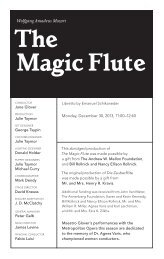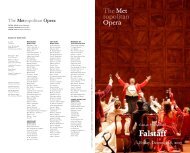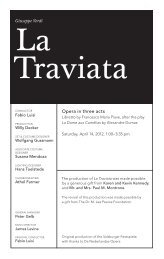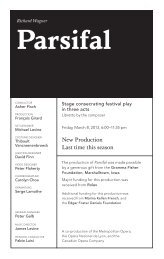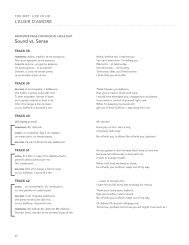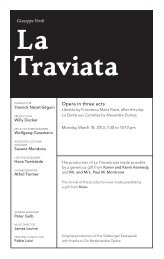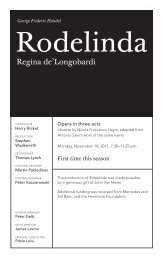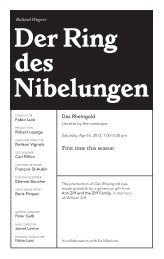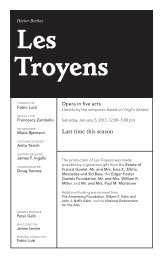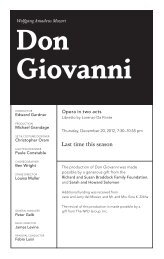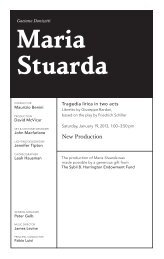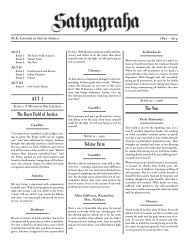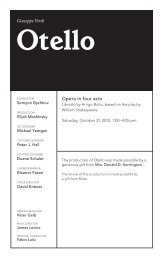Charles Gounod Faust - Metropolitan Opera
Charles Gounod Faust - Metropolitan Opera
Charles Gounod Faust - Metropolitan Opera
Create successful ePaper yourself
Turn your PDF publications into a flip-book with our unique Google optimized e-Paper software.
Program Note CONTINUED<br />
impresario cited concerns that the work would not be spectacular enough, but<br />
one has to wonder whether it had more to do with the composer’s two earlier<br />
flops. In any case, the emerging Théâtre Lyrique swooped in to ask that <strong>Gounod</strong><br />
write <strong>Faust</strong> for its stage instead, and he jumped at the opportunity.<br />
<strong>Gounod</strong>’s librettists were nominally Jules Barbier and Michel Carré, but<br />
Carré’s main contribution was to allow Barbier a free hand in drawing much of the<br />
libretto’s text from Carré’s <strong>Faust</strong> et Marguerite, a three-act “drame fantastique”<br />
based loosely on Part I of Goethe’s play. In Carré’s drama and <strong>Gounod</strong>’s<br />
opera, the tale is thinned down to its basics. Rather than an all-encompassing<br />
rumination on the human condition, we have a simple, affecting love story: man<br />
seduces woman, abandons her, realizes too late that he is truly in love, and<br />
attempts to rescue her from tragic circumstances of his own making. That there<br />
is a demonic bargain thrown into the mix seems almost an afterthought. But the<br />
drastic shift in tone and reduction of ambition compared to Goethe’s original<br />
are also the reasons for the opera’s success. Schumann, et al. were right—<br />
attempting to create an operatic equivalent of Goethe’s star-gazing drama is<br />
a fool’s errand. But at the heart of it is a down-to-earth, grippingly human story<br />
fairly begging for music. (To distance <strong>Faust</strong> the opera from the play, it is to this<br />
day often performed under the title Margarethe in German-speaking countries,<br />
a practice introduced in 1861 in Dresden.)<br />
<strong>Faust</strong> premiered at the Théâtre Lyrique in 1859, but it took a decade and<br />
multiple revisions before it settled into “completed” form. <strong>Gounod</strong> made<br />
various cuts during rehearsals for the premiere and continued to experiment<br />
with including and omitting a variety of scenes in subsequent performances. The<br />
original version also contained spoken dialogue rather than recitative; <strong>Gounod</strong><br />
had to go back the following year and write music for those sections so the<br />
work could be performed outside France. For an 1864 London production, he<br />
added Valentin’s famous Act II aria, “Avant de quitter ces lieux,” for the popular<br />
baritone <strong>Charles</strong> Santley, who was annoyed at his character’s lack of opportunity<br />
for vocal display. The most important addition, though, came in 1869, when the<br />
work finally made it onto the stage of the Paris <strong>Opera</strong>, for which <strong>Gounod</strong> had<br />
intended it in the first place. Here, a show was not complete without a ballet, so<br />
<strong>Faust</strong>’s fifth act gained a 20-minute dance section in the Walpurgis Night scene.<br />
Though this is one of many operas that have been subjected to vicious cuts<br />
over the years, audiences today generally hear the full—or almost full—score.<br />
For this Met production, most of the ballet (the only section of the opera still<br />
frequently omitted in performance) has been restored.<br />
The first production at the Théâtre Lyrique was only modestly successful, but<br />
<strong>Faust</strong> did eventually become <strong>Gounod</strong>’s hit. Following the Paris premiere, the<br />
publisher Antoine de Choudens bought the rights for a bargain 10,000 francs<br />
and took the opera on tour through Germany, Belgium, Italy, and England,<br />
40 Visit metopera.org



